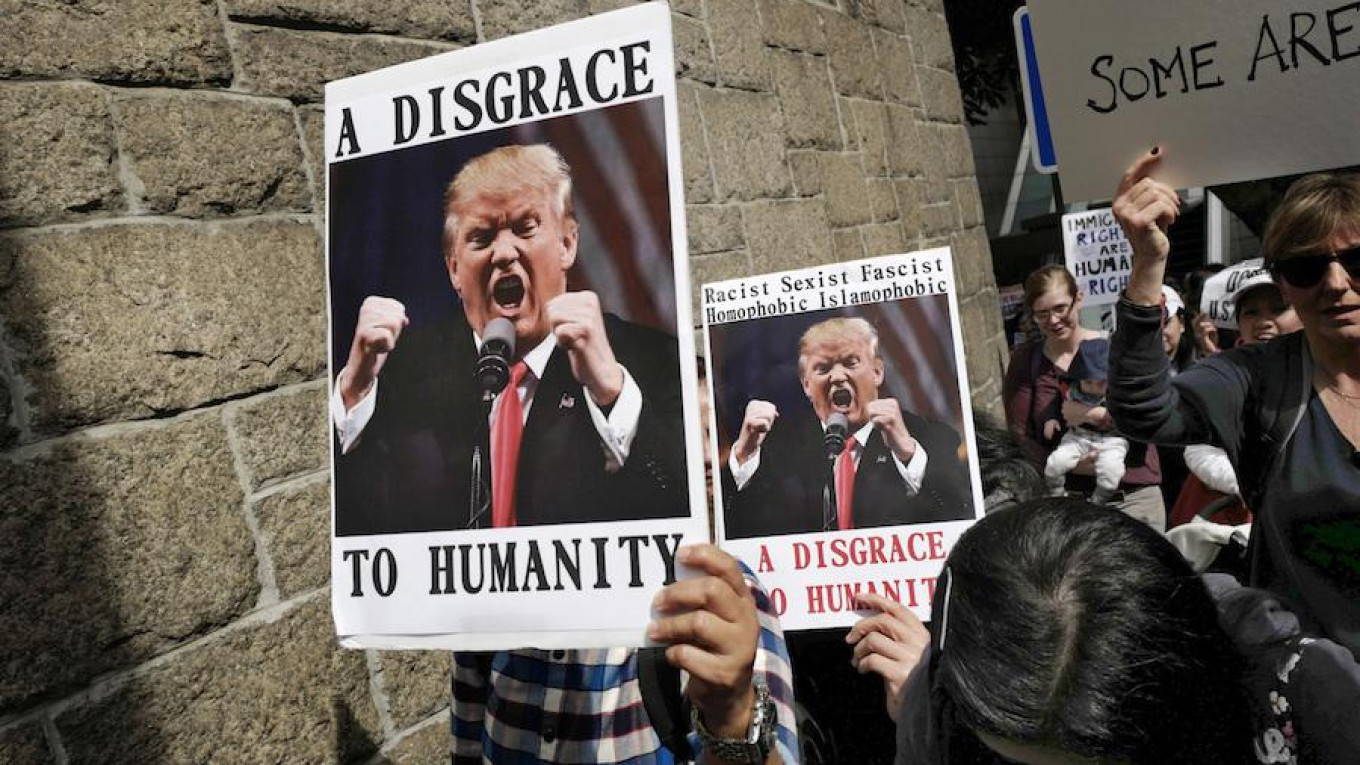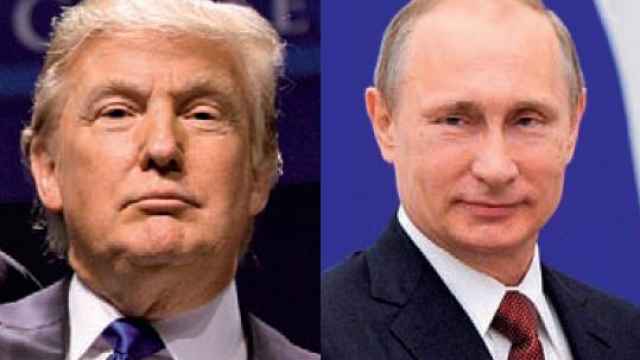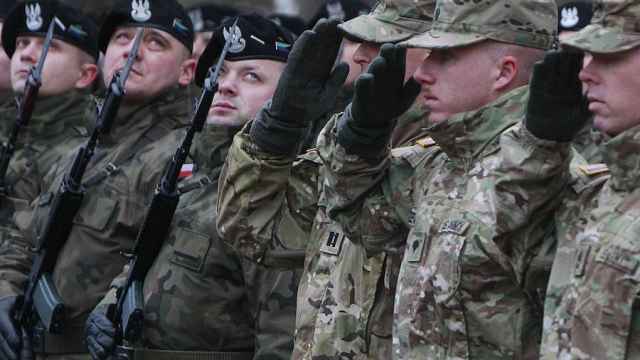Shock, as ever, was followed by denial. The American people couldn’t have consciously committed such a suicidal act, so the logic went. They must have fallen under the charms of Russian agents of influence.
If you were to read the headlines, you would think Moscow had an unrivaled capacity to change the course of world history. The Kremlin, no doubt, is reveling in the idea of its supposedly supernatural abilities. In reality, however, the impact of its hectic interventions was quite modest, if not insignificant.
It’s not Russian hackers or FSB spooks who made half of America vote for Trump. The reason that Trump pulled off his shock victory is the deep polarization of U.S. society; the emergence of two American nations — one liberal, the other illiberal.
The United States is not unique. Pretty much every nation in Europe is either already polarized, or drifting in that direction.
The new global political barricade cuts through nations, ethnicities, religion, and even families. Notions of right and left, or geopolitical divides are no longer relevant. In simple terms, it is the conflict between the 20th and 21st century.
Those who look back at the 1930s or 1960s with nostalgia invariably end up voting for Trump, Putin, Brexit, or the swarm of populist nationalists besieging the European Union. People on the other side of the barricade — weak and naive as they may be — want the world to keep moving forward as it did during the post World War II era.
The breakdown differs from nation to nation. In Russia, polls show only between 14% and 20% actively oppose Vladimir Putin’s regime, which has built a broad support base by glorifying (and falsifying) Soviet and imperial history. In the U.S., with its healthier political culture and stronger institutions, a relative majority actually voted for Hillary Clinton, even though Trump eventually won on account of the adjusted electoral college vote.
Yet it is exact same divide that runs through the U.S., Russia and much of Europe. The split is generated by contemporary global culture, not by these countries’ rather different histories. A modern Russian (or Polish, or British) progressive liberal is culturally closer to their American equivalents than to compatriots in the opposite political camp. Progressive liberals all around the developed world live in the same cultural bubble. They watch the same TV series, read the same books, copy the same role models and laugh at the same jokes. Their opponents, meanwhile, live in a shared global bubble of kitsch infotainment, sleazy tabloids and fake news inciting hatred towards immigrants and intellectuals.
Ironically, it was the camp of backward-looking isolationists that completed the process of political globalization when they started liaising and helping one another in their endeavors. The likes of Trump, Putin, Nigel Farage and Marine Le Pen are now acting as a united front in their effort to undo the imperfect, yet rather comfortable, world that emerged after the fall of European Communism in 1991.
As with many historical macro-alliances, the emerging Nationalist International is full of internal contradictions. The main one derives from the fact that it is hard to sustain a global alliance while spreading hatred and animosity toward neighbors and minorities. These movements and regimes suffocate without a clear enemy they can vent people’s anger at. For this very reason, it will be hard for Vladimir Putin to operate domestic politics in the absence of a perceived American threat.
Hitler, of course, resolved this dilemma and found valuable allies all across Europe by directing people’s fury towards the Jews, a minority present in every European country. In a similar fashion, today’s far-right are all targeting Muslim immigrants and, increasingly, their own liberal-minded compatriots. The main immediate result of Trump’s victory is that the structured and more-or-less predictable post-1991 world is gone. In its place is a window of possibility for both horrible and unbelievably optimistic scenarios.
Ultimately, our future will depend on the moral, intellectual and—alas—physical strength of those on either side of the global barricade.
Those who look back at the 1930s or 1960s with nostalgia invariably end up voting for Trump, Putin, Brexit, or the swarm of populist nationalists besieging the European Union. People on the other side of the barricade — weak and naive as they may be — want the world to keep moving forward as it did during the post World War II era.
The breakdown differs from nation to nation. In Russia, polls show only between 14% and 20% actively oppose Vladimir Putin’s regime, which has built a broad support base by glorifying (and falsifying) Soviet and imperial history. In the U.S., with its healthier political culture and stronger institutions, a relative majority actually voted for Hillary Clinton, even though Trump eventually won on account of the adjusted electoral college vote.
Yet it is exact same divide that runs through the U.S., Russia and much of Europe. The split is generated by contemporary global culture, not by these countries’ rather different histories. A modern Russian (or Polish, or British) progressive liberal is culturally closer to their American equivalents than to compatriots in the opposite political camp. Progressive liberals all around the developed world live in the same cultural bubble. They watch the same TV series, read the same books, copy the same role models and laugh at the same jokes. Their opponents, meanwhile, live in a shared global bubble of kitsch infotainment, sleazy tabloids and fake news inciting hatred towards immigrants and intellectuals.
Ironically, it was the camp of backward-looking isolationists that completed the process of political globalization when they started liaising and helping one another in their endeavors. The likes of Trump, Putin, Nigel Farage and Marine Le Pen are now acting as a united front in their effort to undo the imperfect, yet rather comfortable, world that emerged after the fall of European Communism in 1991.
As with many historical macro-alliances, the emerging Nationalist International is full of internal contradictions. The main one derives from the fact that it is hard to sustain a global alliance while spreading hatred and animosity toward neighbors and minorities. These movements and regimes suffocate without a clear enemy they can vent people’s anger at. For this very reason, it will be hard for Vladimir Putin to operate domestic politics in the absence of a perceived American threat.
Hitler, of course, resolved this dilemma and found valuable allies all across Europe by directing people’s fury towards the Jews, a minority present in every European country. In a similar fashion, today’s far-right are all targeting Muslim immigrants and, increasingly, their own liberal-minded compatriots. The main immediate result of Trump’s victory is that the structured and more-or-less predictable post-1991 world is gone. In its place is a window of possibility for both horrible and unbelievably optimistic scenarios.
Ultimately, our future will depend on the moral, intellectual and—alas—physical strength of those on either side of the global barricade.
A Message from The Moscow Times:
Dear readers,
We are facing unprecedented challenges. Russia's Prosecutor General's Office has designated The Moscow Times as an "undesirable" organization, criminalizing our work and putting our staff at risk of prosecution. This follows our earlier unjust labeling as a "foreign agent."
These actions are direct attempts to silence independent journalism in Russia. The authorities claim our work "discredits the decisions of the Russian leadership." We see things differently: we strive to provide accurate, unbiased reporting on Russia.
We, the journalists of The Moscow Times, refuse to be silenced. But to continue our work, we need your help.
Your support, no matter how small, makes a world of difference. If you can, please support us monthly starting from just $2. It's quick to set up, and every contribution makes a significant impact.
By supporting The Moscow Times, you're defending open, independent journalism in the face of repression. Thank you for standing with us.
Remind me later.







